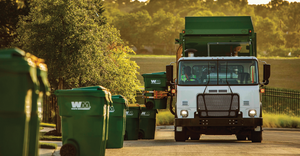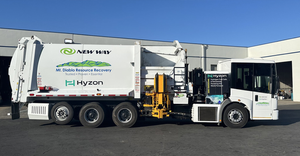Updated: EPA Announces Enforcement Discretion Policy for COVID-19
The policy addresses different categories of noncompliance differently.

The U.S. Environmental Protection Agency (EPA) is mindful of the health and safety of the public, its staff and those of federal agencies, state and local governments, tribes, regulated entities, contractors and nongovernmental organizations during the COVID-19 pandemic. EPA is taking these important considerations into account as the work to protect human health and the environment continues. Accordingly, EPA is announcing a temporary policy regarding EPA enforcement of environmental legal obligations during the COVID-19 pandemic.
EPA's temporary enforcement discretion policy applies to civil violations during the COVID-19 outbreak. The policy addresses different categories of noncompliance differently. For example, under the policy, EPA does not expect to seek penalties for noncompliance with routine monitoring and reporting obligations that are the result of the COVID-19 pandemic but does expect operators of public water systems to continue to ensure the safety of drinking water supplies. The policy also describes the steps that regulated facilities should take to qualify for enforcement discretion.
"EPA is committed to protecting human health and the environment but recognizes challenges resulting from efforts to protect workers and the public from COVID-19 may directly impact the ability of regulated facilities to meet all federal regulatory requirements," said EPA Administrator Andrew Wheeler in a statement. "This temporary policy is designed to provide enforcement discretion under the current, extraordinary conditions, while ensuring facility operations continue to protect human health and the environment."
The temporary policy makes it clear that EPA expects regulated facilities to comply with regulatory requirements, where reasonably practicable, and to return to compliance as quickly as possible. To be eligible for enforcement discretion, the policy also requires facilities to document decisions made to prevent or mitigate noncompliance and to demonstrate how the noncompliance was caused by the COVID-19 pandemic.
This policy does not provide leniency for intentional criminal violations of law, and it does not apply to activities that are carried out under Superfund and Resource Conservation and Recovery Act Corrective Action enforcement instruments. EPA will address these matters in separate communications.
EPA's policy will apply retroactively beginning on March 13. EPA will assess the continued need for and scope of this temporary policy on a regular basis and will update it if EPA determines modifications are necessary.
In order to provide fair and sufficient notice to the public, EPA will post a notification at least 7 days prior to terminating this temporary policy. Members of the public can help protect the environment by identifying and reporting environmental violations.
This policy announcement from EPA comes after the National Waste & Recycling Association (NWRA) wrote to Wheeler seeking regulatory flexibility.
"NWRA and its member companies remain committed to protecting the public’s health and the environment. We thank the EPA for recognizing the enforcement challenges during this global health crisis and providing needed flexibility," said NWRA President and CEO Darrell Smith in a statement.
Shortly after the policy announcement was made, EPA on April 2 sent a letter to all members of Congress to correct the record on the temporary enforcement policy. According to EPA, "As should be apparent to anyone who reads the policy, allegations that EPA 'will cease all enforcement actions during the coronavirus pandemic' and that the temporary policy 'absolves polluters of all responsibility' are simply not true.
"EPA’s enforcement authority and responsibility remains active," said Wheeler. "This is not a nationwide waiver of environmental rules. We will continue to work with federal, state and tribal partners to ensure that facilities are meeting regulatory requirements, while taking appropriate steps to protect the health of our staff and the public."
The policy says that EPA will not seek penalties for noncompliance with routine monitoring and reporting requirements, if, on a case-by-case basis, EPA agrees that such noncompliance was caused by the COVID-19 pandemic. Regulated parties must document the basis for any claim that the pandemic prevented them from conducting that routine monitoring and reporting and present it to EPA upon request. This action was necessary to avoid tying up EPA staff time with questions about routine monitoring and reporting requirements and instead allow EPA to focus on continued protection of human health and the environment.
The policy does not say that the COVID-19 pandemic will excuse exceedances of pollutant limitations in permits, regulations and statutes. EPA expects regulated entities to comply with all obligations, and if they do not, the policy says that EPA will consider the pandemic, on a case-by-case basis, when determining an appropriate response. Further, in cases that may involve acute risks or imminent threats, or failure of pollution control or other equipment that may result in exceedances, EPA’s willingness to provide even that consideration is conditioned on the facility contacting the appropriate EPA region, or authorized state or tribe, to allow regulators to work with that facility to mitigate or eliminate such risks or threats.
It is not unusual for EPA to exercise enforcement discretion to address emergency situations that disrupt normal operations, such as hurricanes. What is unusual is that the current crisis caused by the COVID-19 pandemic affects the entire nation, rather that a discrete geographic area.
EPA has been inundated with questions from both state regulators and the regulated community about how to handle the current extraordinary situation where contractors are not available because they cannot travel, state and local governments are imposing stay at home orders and the number of people who have contracted COVID-19 and are in quarantine is rising. EPA developed the temporary policy to allow EPA to prioritize its resources to respond to acute risks and imminent threats, rather than making upfront case-by-case determinations regarding routine monitoring and reporting. The development of the policy was a group effort, involving multiple calls with and drafts shared among EPA staff and managers, both career and political, at both headquarters and in the regions.
EPA expects regulated facilities to comply with regulatory requirements, where reasonably practicable, and to return to compliance as quickly as possible once the COVID-19 threat is over. Additionally, the policy makes clear that EPA expects operators of public water systems to continue normal operations and maintenance during this time, as well as required sampling, to ensure the safety of vital drinking water supplies.
According to EPA, the measures in this policy are temporary and will be lifted as soon as normal operations can resume, which may occur sooner in some locations than others. EPA takes its environmental mandate to protect human health and the environment very seriously and will continue to carry it out during this time.
About the Author
You May Also Like


